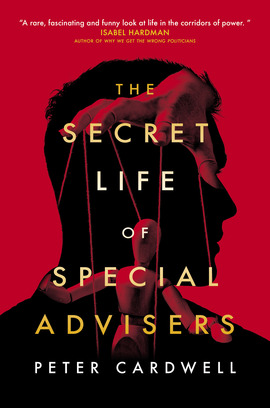Peter Cardwell's book The Secret Life of Special Advisers is out! To celebrate, we asked Peter a few key questions about his time as a mysterious aide to four government ministers- and what he learned from it...
 Why did you want to write The Secret Life of Special Advisers?
Why did you want to write The Secret Life of Special Advisers?
It actually wasn’t my idea! My great friend and former Newsnight colleague Michael Crick had been speaking to his editor at Biteback, Olivia Beattie, about an idea for a book written by a SpAd. Michael very kindly put Olivia and me in touch. As I had been ‘reshuffled’ in February (sacked) and was looking for something to do, writing a book about the previous four years of my life sounded like a fun prospect.
What made you want to become a Special Adviser?
I was a journalist for 10 years before becoming a SpAd and I had seen the great work done by a number of SpAds of varying political persuasions. Michael Salter at Number 10, Fiona Hill at the Home Office, Paul Stephenson at Transport and Katie Waring at the Business department are just a few examples of SpAds I found very helpful, straightforward and they are just some of the people who inspired my move from journalism and into politics. Timing is everything, and I was very lucky that Fiona Hill became co-Chief of Staff to Mrs May at 10 Downing Street in the summer of 2016. As I outline in the book, I remember emailing Fiona my CV and thinking I would never hear another word about it. A week later I had been confirmed as special adviser to James Brokenshire, the then Secretary of State for Northern Ireland.
How does one become a Special Adviser? What do they do?
It’s an odd process of recruitment -- there’s an entire chapter about it in the book -- but my personal recruitment was via Fiona Hill, then co-Chief of Staff at 10 Downing Street. I had known and worked with Fiona previously when she was special adviser to Theresa May at the Home Office. When Fiona went to Downing Street, I emailed her my CV, was interviewed by James Brokenshire, the Northern Ireland Secretary I then became SpAd to, and that was basically it. As I outline in the book, there is a slightly different process now which is a bit more formal. In terms of what SpAds do, it’s an odd combination of adviser, friend, gatekeeper, defender, spokesman or woman and occasional wardrobe consultant and supplier of Snickers bars -- see the book for a whole lot more!
How much influence do they have in government?
It depends on the SpAd and it depends on the government department, but the answer is a lot. The main advantages a SpAd can bring to a Cabinet minister’s life is a good relationship with Number 10 SpAds -- to know how to get things done -- and to be the voice of their minister. If you don’t have these two things, your usefulness as a SpAd is diminished and you may as well be another civil servant. It’s often said that advisers advise and ministers decide, and that is of course true, but your role is also to keep things off the minister’s desk and make their life as simple as possible so they can grapple with the really big issues.
What’s your favourite anecdote from your time as a SpAd?
I think my favourite anecdote is when the then Prime Minister, Theresa May, and I were talking on the 2017 campaign trail as I escorted her to a BBC interview and she wished me a happy birthday. I write about it in the elections chapter of the book. It was such a touching, special moment, and she had so many things on her plate yet still took time to make my 33rd birthday a very memorable one. She then said that I probably didn’t expect to be in a conference centre in Derby with her on my birthday, to which I replied that I wasn’t, and was meant to be in the south of France having a glass of wine, but then that she had ruined that plan! Luckily, she realised I was joking and laughed heartily -- and I kept my job!
What’s the one thing you did during your time as a SpAd that you’re proudest of?
Working closely with James Brokenshire when he was Housing Secretary and a brilliant civil servant, Jeremy Swain, to get the numbers of people who were rough sleeping down -- the first reduction in nine years, which was followed by a much larger drop the following year -- was a very special thing. Helping people who often cannot help themselves is what government should be about.
The Secret Life of Special Advisers is out now. Take a look at it here!
